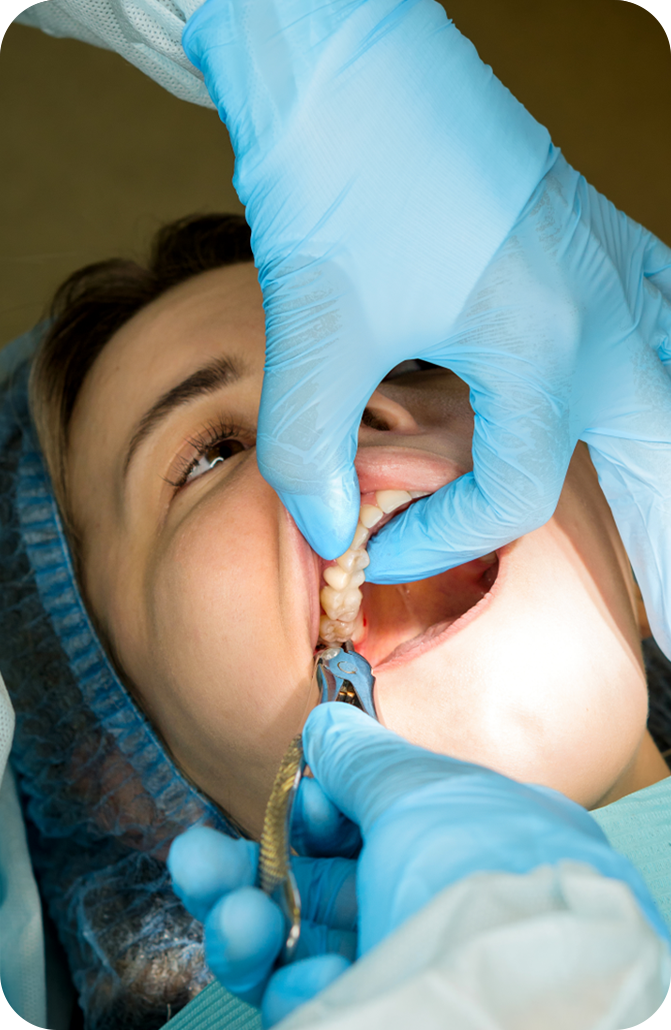Tooth Extraction
$$$ Affordable and pain-free Tooth Extractions. Experienced dentists, latest technology and techniques for remarkable results.
- Home
- Tooth Extraction

A tooth extraction is a procedure to remove a tooth from its socket in the jawbone performed by a dentist, oral surgeon, or periodontist.
Reasons for tooth extraction:
- Damaged or broken tooth
- Tooth decay
- Periodontal disease
- Crowded teeth
- Wisdom teeth
- impacted teeth
Tooth Extraction Cost
On average, tooth extractions typically cost between 250 to 300 dollars for simple extractions and 350 to 450 dollars for difficult surgical procedures per tooth.
Worried about financial stress?

At choice provider Dentist, our tooth extractions have never been more affordable.
You have the option to “pay as you go” using your health funds or to pay in instalments, making it easier to achieve the smile you’ve always wanted.



Tooth Extraction Treatment Process

Consultation & Assessment
Book an appointment or call our friendly team today at
9749 0422.
Let’s discuss your treatment plan, costs, payment options and answer any questions you may have.
Before the procedure, your dentist will assess the condition of the tooth and take any necessary X-rays.
We are the choice provider for dental patients and accept Amex and the option to pay in instalments.

Anaesthesia
In most cases, a local anaesthetic (such as lidocaine) is injected around the tooth and gums to numb the area. This ensures you won’t feel pain during the procedure, though you may feel pressure or vibrations.
For patients who are anxious or having a more complicated extraction (such as wisdom teeth), sedation options like laughing gas (nitrous oxide) or oral sedatives may be offered. In more complex cases, general anaesthesia might be used, making you fully unconscious during the procedure.

Loosening the root
If the tooth is fully erupted, the dentist will use an elevator tool to gently rock the tooth back and forth to loosen it from the ligaments and bone around it.
Once the tooth is loosened, the dentist uses forceps (special pliers) to grasp and remove the tooth. The dentist may apply gentle pressure to pull the tooth out, especially if it’s still partially in the gum or bone.

Surgical Extraction
If the tooth is impacted or broken, the dentist may need to make a small incision in the gum to access it.
In some cases, part of the bone surrounding the tooth may need to be removed to make the extraction easier.
If the tooth is difficult to remove in one piece, the dentist may cut it into smaller sections for easier removal.

Post-Extraction Care
Cleaning the Area: After the tooth is removed, the dentist will clean the extraction site and will place a gauze pad to help stop bleeding.
Stitches: If the dentist made an incision, they may need to place stitches (sutures) to help the gums heal. Some stitches dissolve on their own, while others may need to be removed in a follow-up appointment.
Blood Clot Formation: A blood clot will begin to form in the socket, which is crucial for the healing process. It’s important to avoid disturbing the clot to prevent complications like dry socket.

Recovery and Instructions
After the extraction, the dentist will give you post-operative care instructions, including advice on managing pain, swelling, and how to care for the extraction site.
This typically includes:
– Applying ice to reduce swelling
– Taking prescribed pain relievers or over-the-counter medications
– Avoiding certain foods or activities (like sucking or drinking through a straw) that could disturb the healing site
You may also be given antibiotics to prevent infection, depending on the complexity of the procedure.
Tooth Extraction Aftercare Dos and Don'ts
Surgical Extraction
- Use gauze, rest, and elevate your head
- Take prescribed medications
- Use ice packs for pain relief
- Eat soft foods for the first 24-48 hours
- Brush and floss normal
Don'ts
- Don't smoke
- Don't use straw to drink liquids and blow your nose if you have upper tooth extraction
- Don't spit
- Avoid the extraction site for eating
- Avoid the area for 24-48 hours
Emergency Tooth Extractions
We offer emergency tooth extraction services at Wyndham Smile Care Dentist for walk-in patients. If you’re experiencing severe tooth pain, infection, or damage, split tooth that requires immediate attention, we’re here to help. Our experienced team provides quick and professional care, ensuring that you get the relief you need without the wait. Whether it’s a wisdom tooth, broken tooth, swelling or another dental emergency, we prioritise your comfort and safety during the procedure. Walk in anytime, and we’ll take care of the rest.
Bulk Billing Dentist for Tooth Extractions
Bupa Platinum, Medibank, AHM, NIB, HCF Choice Provider offering affordable Porcelain Veneers
As a Choice Provider Bupa Platinum, Medibank, AHM, NIB, HCF and more for local residents,
Benefits of visiting #1 Choice
Dental provider
- Lower out-of-pocket – generally less than non-Members Choice providers
- Capped prices – no surprises in your bill
- Discounts – at retailers for orthodontics



Tooth Replacement Options
What Our Patients Say!
Posted onTrustindex verifies that the original source of the review is Google. I have been seeing Jasprett, since 2018. Amazing professional. I have had all kind of dental work , you can imagine, but I have never been disappointed with the result. From the moment you walk in, you are greeted with friendly staff. Highly recommend Jaspreet for anyone thinking of trying a new dentistPosted onTrustindex verifies that the original source of the review is Google. We have been getting dental care from Dr. Jaspreet in Wyndham Smile Care over last 10 years. So happy with the care and professional service we received.Posted onTrustindex verifies that the original source of the review is Google. Crowns and bridge work by Doctor Jaspreet was a very big job but was completed in a very caring manner. The staff have been very helpful and the work was well done snd very much appreciated. I am very happy to recommend this dentist.
Owner's reply
Hi Bill Buckles, Thank you so much for your kind words and sharing your positive experience with Dr. Jaspreet and her staff. Crown and bridge job can be overwhelming but we are pleased to hear that you were satisfied with your treatment. Your recommendation means a lot to us. Looking forward to seeing you in near future. Warm Regards Wyndham smile care teamPosted onTrustindex verifies that the original source of the review is Google. Dr Jaspreet Kaur and Harjinder performed well for the treatment. They take care of the patient and cooperative. Wishing them all the best.
Owner's reply
Hi Edward, Thank you so much for your kind words. Dr.Jaspreet and Harjinder will be thrilled to know that you have positive experience with us. Our team takes pride in caring for you for your dental needs. Looking forward to seeing you in near future. Warm Regards Wyndham smile care teamPosted onTrustindex verifies that the original source of the review is Google. After having a horrible experience at a dentist in the city, I chose to come here based solely on the reviews. Well let me tell you, every positive review about Wyndham Smile care is spot on! Reception staff were lovely, and Dr Jaspreet was absolutely fantastic. I was so beyond anxious to come get a filling (after my last filling at a different dentist left me with ongoing pain), but Dr Jaspreet’s calming nature and gentle hand made it as comfortable as possible. So glad to have found a talented team to assist with my dental care needs. Yay 🥳
Owner's reply
Hi Cheyenne, Thank you so much for your kind words and a beautiful review. We are truly sorry to hear your past experience but we are glad you gave us the opportunity to look after your dental needs. Dr Jaspreet and her staff are thrilled to know that you have had positive experience with us. Your recommendation means a lot to us. Looking forward to seeing you in the future. Warm Regards Wyndham smile care teamPosted onTrustindex verifies that the original source of the review is Google. Very happy with the dental work l had by Dr Jaspreet and the team at Wyndham Smile Care, thankyou.
Owner's reply
Hi Johny Warbo, Thank you so much for your kind words. We are pleased to hear that you have positive experience with Dr Jaspreet and her friendly staff. It means a lot to us. We look forward to seeing you again. Warm Regards Wyndham smile care teamPosted onTrustindex verifies that the original source of the review is Google. I have been visiting Wydham Smile Care along with my wife for over 5 years. We are happy with the care we have received. Dr. Jaspreet has always given me sound advice and great care at reasonable cost as well. Staff is friendly and their online booking system is very handy. I have had regular clean and wisdom teeth extracted with great results.
Owner's reply
Hi Dilpreet, Thank you so much for your kind words and for being part of Wyndham smile care for over 5 years. We are pleased to hear that you and your family have positive experience with Dr Jaspreet and her team. Thank you for your recommendation and it means a lot to us. We look forward to seeing you and your family for many more years to come. Warm Regards Wyndham smile carePosted onTrustindex verifies that the original source of the review is Google. We've been visiting Wyndham Smile Care since 2018 with our young children and my husband. Dr. Jaspreet has been our trusted dentist from the beginning, consistently showing a kind, gentle, and caring approach during every visit. Highly recommended, especially if you're someone who feels anxious about dental treatment.
Owner's reply
Hi Trudy, Thank you so much for your kind words and we are very pleased to know you and your family have positive experience with Dr Jaspreet and her team. Your trust in us and recommendation means a lot. We feel privileged to be your trusted dental provider and looking forward to seeing you again in near future. Warm Regards Wyndham smile care teamPosted onTrustindex verifies that the original source of the review is Google. Our family has been visiting Wyndham Smile Care for our regular six-monthly check-ups for several years now, and we couldn’t be happier with the experience. The staff are always friendly, welcoming, and incredibly accommodating especially when it comes to scheduling appointments around our kids’ routines. We’ve been seeing Dr. Jaspreet Kaur, and she is truly an exceptional dentist. Her patience, professionalism, and gentle manner with children make every visit stress-free. She genuinely cares about her patients and takes the time to ensure everyone feels comfortable and well looked after. We’re grateful to have found such a wonderful dental practice
Owner's reply
Hi, Thank you so much for your kind words and ongoing trust in our team! We're truly grateful to have your family as part of our practice. It's always a pleasure to care for your smiles, and we're so glad to hear that Dr. Jaspreet Kaur and our staff have made your visits comfortable and stress-free — especially for the little ones. We look forward to seeing you again at your next check-up. Thank you for your continued support! Warm regards, The Wyndham Smile Care TeamGoogle rating score: 4.8 of 5, based on 133 reviews

Frequently Asked Questions about Tooth Extraction
What happens if you leave the tooth untreated which requires extraction?
Infection: If the tooth is decayed or infected, leaving it untreated can lead to the infection spreading to the surrounding teeth, gums, or even into the jawbone. An untreated infection can cause severe pain, swelling, and may require more extensive treatment later, such as a root canal or even the loss of more teeth.
Abscess Formation: A dental abscess (a pocket of pus) can form around the tooth, leading to more severe pain, swelling, and a risk of the infection spreading to other areas of the body, such as the bloodstream (sepsis).
Increased Pain: If the tooth is already damaged, decayed, or infected, you may experience constant pain, sensitivity to hot and cold, or even pain when chewing or biting.
Damage to Surrounding Teeth: If the tooth is severely damaged, it can affect the adjacent teeth. For example, a broken or infected tooth can lead to shifting of the teeth around it, bite issues, or damage to the roots of nearby teeth.
Potential for Gum Disease: If the tooth is damaged to the point that it cannot be properly cleaned, bacteria can accumulate in the surrounding areas, leading to gum disease (gingivitis or periodontitis), which can affect the health of your gums and bone structure.
Crowding or Shifting of Teeth: If the tooth in question is a tooth that holds space for others, leaving it untreated can cause nearby teeth to shift or crowd. This could eventually cause bite problems and lead to the need for orthodontic work in the future.
Chronic Bad Breath: If the tooth is infected or decayed, it may lead to chronic bad breath (halitosis), as bacteria in the mouth release unpleasant odors.
What should I do before a tooth extraction?
Consult your dentist; Ask about the process, any potential risks, and what to expect during and after the procedure. If you have any underlying health conditions (like heart disease,stroke, kidney problems, osteoporosis , arthritis or diabetes), make sure to inform your dentist, as this may affect the procedure or healing process.
If you are taking any medications like blood thinners, medications/ injections for osteoporosis ( PROLIA), long term steroids , please inform your DENTIST.
Taking over the counter analgesics like Ibuprofen can help to reduce the discomfort during the procedure.
How long does a tooth extraction procedure take?
The length of a tooth extraction procedure can vary depending on several factors, such as the complexity of the extraction, the tooth being removed, and whether the procedure is routine or surgical.
Simple Extraction: If the tooth is fully erupted, has no complications, and is in good condition, the procedure typically takes around 20 to 40 minutes. The dentist will numb the area with local anesthesia, loosen the tooth, and remove it without the need for incisions or stitches.
Surgical Extraction: If the tooth is impacted (not fully erupted or embedded in the gum or bone), the procedure can take longer. A surgical extraction might involve cutting into the gum or bone to remove the tooth. This can take anywhere from 45 minutes to 1 hour, or even longer, depending on the complexity.
What happens during tooth extraction?
- Before the procedure, your dentist will assess the condition of the tooth and take any necessary X-rays.
- Local anaesthetic is given to numb the tooth and gums
- The dentist uses a special tool to loosen the tooth
- The tooth is removed with forceps
- The socket is cleaned and disinfected
- Stitches may be placed
Refer to Tooth Extraction Treatment Process above.
What are the risks of the tooth extraction procedure?
Infection: Any surgery, including tooth extraction, can introduce bacteria into the body. Infections can occur at the extraction site or in the surrounding tissues if not properly cared for after the procedure.
Excessive Bleeding: It’s normal to experience some bleeding after an extraction, you may experience excessive bleeding if you are taking blood thinners, please speak to your GP or dentist if you are taking blood thinners.
Dry Socket: This is a painful condition that occurs if the blood clot that forms in the extraction site is dislodged or fails to form properly. It exposes the bone and can lead to delayed healing.
Nerve Damage: Especially with lower wisdom teeth extractions, which may cause transient or permanent nerve damage. However, chances of permanent nerve damage are unlikely.
Sinus Issues: For extractions of upper molars, the tooth roots may be close to the sinus cavity. If the extraction site is too deep, it may lead to a sinus perforation, causing issues like sinus infections or discomfort. Your Hoppers crossing dentist will give you postoperative instructions to avoid such complications.
Your dentist will give you postoperative instructions to avoid such complications.
Is tooth extraction costly?
Tooth extraction can cost you from 250 to 400 dollars depending on the complexity of extraction, if it is a simple or surgical extraction.
What is tooth extraction dry socket?
Treatment for a dry socket after a tooth extraction typically involves a dentist cleaning the extraction site, packing the socket with a medicated dressing to relieve pain, and potentially prescribing pain medication.
Do surrounding teeth hurt after tooth extraction?
- Referred pain Sometimes, pain from the extraction site can be “referred” to surrounding teeth due to the shared nerve pathways, even if those teeth aren’t directly affected.
- Pressure during extraction: The dentist or oral surgeon may need to apply pressure or manipulate surrounding teeth to remove the extracted tooth, which can cause temporary discomfort in nearby teeth
What happens if the broken tooth root still remains in gum?
A remaining root fragment can create an entry point for bacteria, leading to an infection in the surrounding tissue or bone.
The presence of a root fragment can interfere with the normal healing process of the gum and bone, making it take longer to heal after the extraction.
Do you offer tooth extraction for children?
YES, we do offer tooth extractions at Wyndham Smile Care your dentist.
Tooth extractions for children can cost you 150 to 250 dollars.
When do I see the dentist after tooth extraction?
If you experience severe pain, excessive swelling, pus, fever, or any other unusual symptoms at any point during the recovery, it’s important to contact your dentist immediately. Early intervention can help prevent complications.






